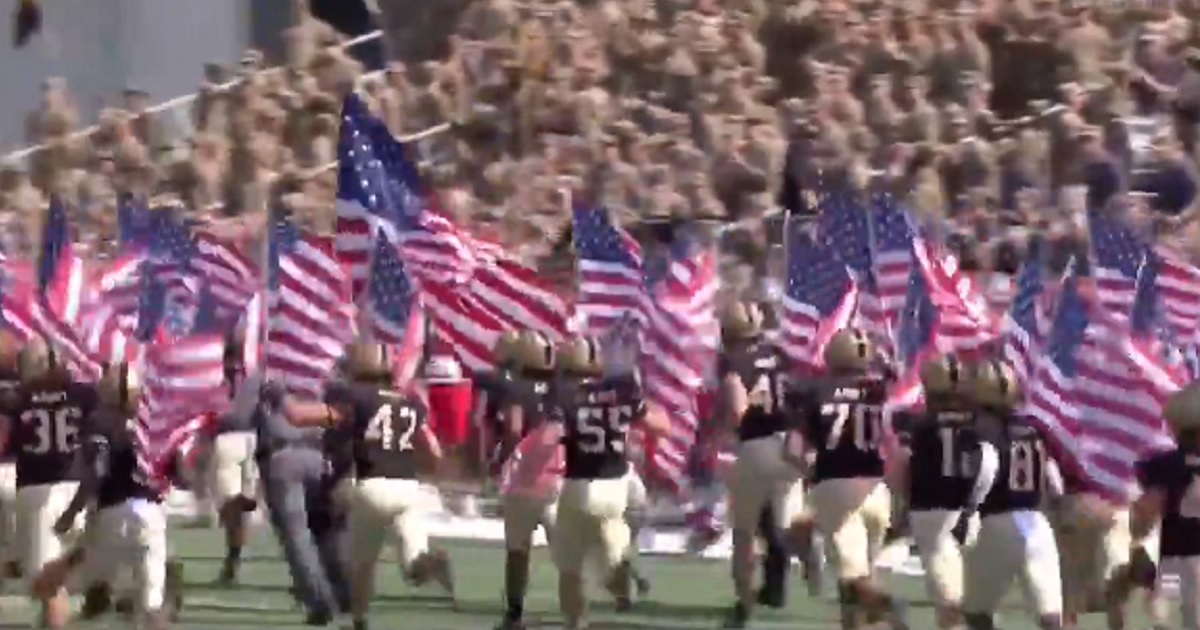Army’s Black Knights sent a powerful message to the nation about love of country and patriotism Saturday – the 20th anniversary of the 9/11 terrorist attacks.
Each individual player carried his own flag as the team rushed onto Michie Stadium — the United States Military Academy’s home field about 50 miles north of New York City where the first plane struck the World Trade Center.
Here come the Black Knights‼️#GoArmy | #LastoftheHard pic.twitter.com/ETMGx9rsue
— Army Football (@ArmyWP_Football) September 11, 2021
THIS IS AMERICA’S TEAM! pic.twitter.com/2LJ861RBwy
— Matt Drinkall (@DrinkallCoach) September 11, 2021
The matchup against Western Kentucky was Army’s first to be played at home with the stadium full of fans since November 2019 before the world was hit with COVID-19. (Army won with a clutch field goal.)
It’s great to be back home.
? WKU
? 11:30 AM
? Michie Stadium
? @CBSSportsNet
? https://t.co/6PsRC463an
? https://t.co/upG0fx0dCk#GoArmy | #LastoftheHard pic.twitter.com/sTKLekiFK2— Army Football (@ArmyWP_Football) September 11, 2021
Lockdowns and COVID-related restrictions caused the Black Knights to play a shortened season of only 11 games in 2020. Then, members the Corps of Cadets were the only fans in the stands.
The Black Knights’ energy was obvious as the team charged out of the tunnel and onto the field. They had a strong start with their season opener last week against Georgia State, beating Georgia 43-10. That game was the 50th win under Army’s coach Jeff Monken, who came on board in 2014.
Monken spoke at length to the Times Herald-Record of Middletown, New York, about his memories of 9/11. Then 34 years old and an assistant coach at Georgia Southern University’s Stateboro campus, he was just starting his fourth season under head coach Paul Johnson.
Monken told the Times Herald-Record that the day started like any other day. The staff was studying film and holding meetings when the news of the attacks started to seep in.
Monken said that the first inkling he had that something was wrong occurred when the strength coach poked his head into the office around 9 a.m. He broke the news that a plane had crashed into one of the towers at the World Trade Center.
“Not too much longer after that, he poked his head back in the door and said a plane hit the other tower,” Monken recalled. “We all just were kind of stunned, maybe not knowing what to do.’’
It wasn’t until hours later that Monken first saw the images that have become etched into the minds of all Americans.
Football practice was over for the day, and Monken had tagged along with his wife to go shopping. In 2001, access to high-speed internet, cable news, and social media on phones wasn’t at everyone’s fingertips like it is today.
“There was a TV on at the store,’’ Monken said. “I stood there for probably an hour and a half and just watched with my mouth open, just in utter disbelief.’’
After the 2001 football season, Monken followed Johnson to the Naval Academy at Annapolis, Maryland, then to Georgia Tech before starting his own head coaching career in 2009 with a return to Georgia Southern. In 2014, he took the head coaching job at Army.
In a career that has included years working with student-athletes at two of the most prestigious military institutions in the world, Monken has thoroughly “embraced the warrior spirit.”
“The great thing about our country … the resolve and the grit and the toughness that’s the backbone of our nation, and there’s no better example of that than our military,” Monken told the Times Herald-Record.
“I’m certain that the young men and women that were here at West Point at the time [of 9/11], they were ready to go,” he said.
“And if somebody said, ‘Hey, we’re going to go get the people that did this,’ they would have been the first one standing in line to go do it, and that’s what I admire about young men on our team and all the young men and women that attend West Point who have made this commitment to serve. They know what the job description is, and they willfully do it…
“This is where they belong, this is what they’re committed to, so it’s just an honor and a privilege to be a part of this institution and to lead this football team.’’
The war on terror has taken a terrible toll on West Point graduates. According to the West Point Association of Graduates, 104 alumni “lost their lives as a result of the attack against our country on September 11th, 2001, or have given their lives in the defense of freedom while fighting the Global War on Terrorism.”
Many more service men and women have endured physical and mental injuries due to their service. Department of Defense data show that service members “wounded in action” numbers from the war on terror are over 7.5 times more than the department’s death numbers.
The ongoing trauma for those who experience PTSD but have never sought treatment or those who endure marital and family stress from deployments add to the carnage that comes in the wake of war.
And less than two weeks ago, the last service member to leave Afghanistan was a West Point graduate, Maj. Gen. Chris Donahue, commander of the U.S. Army 82nd Airborne Division. He graduated from the United States Military Academy in 1992.
When Army’s team took the field on Saturday, they were carrying the flag of the country they’ve sworn to serve.
They know, like every service member knows, that the war on terror is no game. It’s about the survival of that country itself.
And the flags showed it.
This article appeared originally on The Western Journal.

























 Continue with Google
Continue with Google